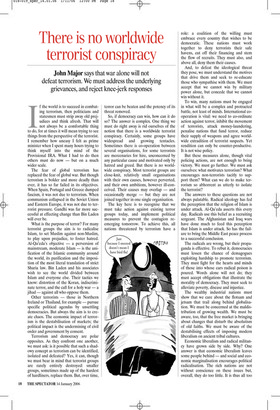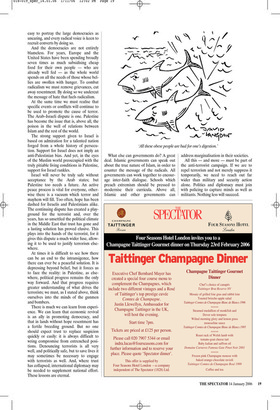There is no worldwide terrorist conspiracy
John Major says that war alone will not defeat terrorism. We must address the underlying grievances, and reject knee-jerk responses
If the world is to succeed in combating terrorism, then politicians and statesmen must strip away old prejudices and think afresh. That will not always be a comfortable thing to do, for at times it will mean trying to see things from the perspective of the terrorist. I remember how uneasy I felt as prime minister when I spent many hours trying to think myself into the mind of the Provisional IRA. What I had to do then others must do now — but on a much wider scale.
The fear of global terrorism has replaced the fear of global war. But though terrorism is bolder and more deadly than ever, it has so far failed in its objectives. When Spain, Portugal and Greece dumped fascism, it was not due to terrorism. When communism collapsed in the Soviet Union and Eastern Europe, it was not due to terrorist pressure. Gandhi was far more successful at effecting change than Bin Laden will ever be.
What is the purpose of terror? For many terrorist groups the aim is to radicalise Islam, to set Muslim against non-Muslim, to play upon prejudice, to foster hatred. Al-Qa’eda’s objective — a perversion of mainstream, moderate Islam — is the unification of the Islamic community around the world, its purification and the imposition of the most literal translation of strict Sharia law. Bin Laden and his associates wish to see the world divided between Islam and everyone else. Their tactics we know: distortion of the Koran, indiscriminate terror, and the call for a holy war — a jihad — against all who oppose them.
Other terrorists — those in Northern Ireland or Thailand, for example — pursue specific political agendas by unsettling democracies. But always the aim is to create chaos. The economic impact of terrorism is the destabilisation of markets; the political impact is the undermining of civil order and government by consent.
Terrorism and democracy are polar opposites. As they confront one another, we must ask: is it possible that such a shadowy concept as terrorism can be identified, isolated and defeated? Yes, it can, though we must bear in mind that terrorist groups are rarely entirely destroyed: smaller groups, sometimes made up of the hardest of hardliners, replace them. But, over time, terror can be beaten and the potency of its threat removed.
So, if democracy can win, how can it do so? The answer is complex. One thing we must do right away is rid ourselves of the notion that there is a worldwide terrorist conspiracy. Certainly, some groups have widespread and growing tentacles. Sometimes there is co-operation between several organisations, for some terrorists are mercenaries for hire, unconcerned by any particular cause and motivated only by hatred and greed. But there is no worldwide conspiracy. Most terrorist groups are close-knit, relatively small organisations with their own causes, however perverted, and their own ambitions, however ill-conceived. Their causes may overlap — and occasionally merge — but they are not joined together in one single organisation.
The key here is to recognise that we must take action against existing terror groups today, and implement political measures to prevent the contagion reemerging tomorrow. To achieve this, all nations threatened by terrorism have a role: a coalition of the willing must embrace every country that wishes to be democratic. These nations must work together to deny terrorists their safe havens, cut off their financing and stem the flow of recruits. They must also, and above all, deny them their causes.
And, to defeat the ideological threat they pose, we must understand the motives that drive them and seek to re-educate those who sympathise with them. We must accept that we cannot win by military power alone, but concede that we cannot win without it.
To win, many nations must be engaged in what will be a complex and protracted battle, not least of minds. International cooperation is vital: we need to co-ordinate action against terror, inhibit the movement of terrorists, attack money-laundering, penalise nations that fund terror, reduce their supply of weapons and agree worldwide extradition of terrorist suspects. Yet rendition can only be counter-productive. It is not wise policy.
But these measures alone, though vital policing actions, are not enough to bring victory. We must go further. We must ask ourselves: what motivates terrorism? What encourages non-terrorists tacitly to support them? What can we do to make terrorism so abhorrent as utterly to isolate the terrorist?
The answers to these questions are not always palatable. Radical ideology has fed the perception that the religion of Islam is under attack. Al-Qa’eda asserts this every day. Radicals use this belief as a recruiting sergeant. The Afghanistan and Iraq wars have done much to feed this perception that Islam is under attack. So has the failure to bring the Middle East peace process to a successful conclusion.
The radicals are wrong, but their propaganda is effective. To rebut it, democracies must lessen the chance of demagogues exploiting hardship to promote terrorism. They must fight for the hearts and minds of those into whose ears radical poison is poured. Words alone will not do; they must accept obligations that illustrate the morality of democracy. They must seek to alleviate poverty, disease and injustice.
The wealthy industrial nations must show that we care about the flotsam and jetsam that trail along behind globalisation. We must be concerned at the maldistribution of growing wealth. We must be aware, too, that the free market is bringing about changes that disturb the absolutism of old faiths. We must be aware of the destabilising effects of imposing modern liberalism on ancient tribal cultures.
Economic liberalism and radical militancy have grown side by side. Why? One answer is that economic liberalism leaves some people behind — and social and economic marginalisation encourages political radicalisation. The rich nations are not without conscience on these issues but, overall, they do too little. It is thus all too easy to portray the large democracies as uncaring, and every radical voice is keen to recruit converts by doing so.
And the democracies are not entirely blameless. For years, Europe and the United States have been spending broadly seven times as much subsidising cheap food for their own people — who are already well fed — as the whole world spends on all the needs of those whose bellies are swollen with hunger. To combat radicalism we must remove grievances, cut away resentment. By doing so we undercut the message of hate that fuels radicalism.
At the same time we must realise that specific events or conflicts will continue to be used to promote the cause of terror. The Arab–Israeli dispute is one. Palestine has become the issue that is, above all, the poison in the well of relations between Islam and the rest of the world.
The strong support given to Israel is based on admiration for a talented nation forged from a whole history of persecution. Support for Israel does not imply an anti-Palestinian bias. And yet, in the eyes of the Muslim world preoccupied with the truly pitiable living conditions in Palestine, support for Israel rankles.
Israel will never be truly safe without acceptance by the Arab states; but Palestine too needs a future. An active peace process is vital for everyone, otherwise there is a vacuum which terror and mayhem will fill. Too often, hope has been dashed for Israelis and Palestinians alike. The continuing dispute has created a playground for the terrorist and, over the years, has so unsettled the political climate in the Middle East that trust has gone and a lasting solution has proved elusive. This plays into the hands of the terrorist, for it gives this dispute a much wider fuse, allowing it to be used to justify terrorism elsewhere.
At times it is difficult to see how there can be an end to the intransigence, how there can ever be a peaceful solution. It is depressing beyond belief, but it forces us to face the reality: in Palestine, as elsewhere, political progress remains the only way forward. And that progress requires greater understanding of what drives the terrorists; we must, as I stated above, think ourselves into the minds of the gunmen and bombers.
There is much we can learn from experience. We can learn that economic revival is an ally in promoting democracy, and that in lands without hope resentment has a fertile breeding ground. But no one should expect trust to replace suspicion quickly or easily: it is always difficult to wring compromise from entrenched positions. Denouncing terrorists is all very well, and politically safe, but to save lives it may sometimes be necessary to engage with terrorists as well. And, where trust has collapsed, international diplomacy may be needed to supplement national effort. These lessons are eternal. What else can governments do? A great deal. Islamic governments can speak out about the true nature of Islam, in order to counter the message of the radicals. All governments can work together to encourage inter-faith dialogue. Schools which preach extremism should be pressed to modernise their curricula. Above all, Islamic and other governments can address marginalisation in their societies.
All this — and more — must be part of the anti-terrorist campaign. If we are to repel terrorism and not merely suppress it temporarily, we need to reach out far wider than military and security action alone. Politics and diplomacy must join with policing to capture minds as well as militants. Nothing less will succeed.















































 Previous page
Previous page